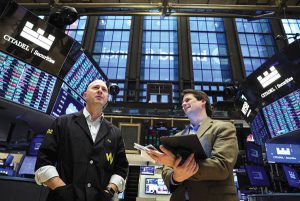Bloomberg
US equity futures fall on Tuesday as the dollar and sovereign bonds rose, a pattern highlighting pervasive unease about the economic outlook amid high inflation and China’s struggles with Covid-19.
S&P 500, Nasdaq 100 shed over 0.5% after a Wall Street slide. The Stoxx Europe 600 gauge slipped for a second day, though it pared the decline with utilities outperforming as EDF jumped after a report that the French government will pay a premium to take control of the electricity company. An Asian share index headed for its biggest two-day drop in a month.
The dollar pushed towards levels last seen at the height of the 2020 market panic over Covid and the yen strengthened, underlining investor caution. The euro-area’s common currency, meanwhile, is within a whisker of parity with the greenback, sapped by the region’s energy crisis and acute recession fears.
Treasuries extended gains, taking the US 10-year yield to 2.92%. Bonds also rallied in Europe. German bonds surged, sending the benchmark 10-year yield to the lowest since May, after data showed investor confidence plunged to a 2011 low.
Much is riding on upcoming company profit filings and this week’s US inflation data. A brief equity rebound from this year’s rout is already fizzling ahead of the reports. Risk appetite may struggle to digest a darkening earnings outlook alongside stubborn price pressures that point to more monetary tightening.
Dollar strength will not only “affect this quarter’s earnings, but more likely it’s going to affect the revenue generation outlook for the next couple of quarters and that, I think, is a big problem,†Kimberly Forrest, founder and chief investment officer of Bokeh Capital Partners, said on Bloomberg Radio.
Commodities including oil and iron ore were under pressure. Bitcoin dropped below $20,000.
Meanwhile, the latest Fed commentary highlighted both the central bank’s hawkishness and the risks that come with aggressive interest-rate hikes.
Fed Bank of Atlanta President Raphael Bostic said the US economy can cope with higher interest rates and repeated his support for another jumbo move this month. Fed Bank of Kansas City President Esther George, who dissented last month against the central bank’s 75 basis-point rate increase, cautioned that rushing to tighten policy could backfire.
 The Gulf Time Newspaper One of the finest business newspapers in the UAE brought to you by our professional writers and editors.
The Gulf Time Newspaper One of the finest business newspapers in the UAE brought to you by our professional writers and editors.
